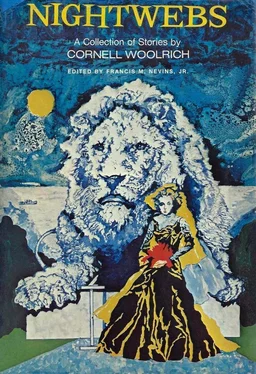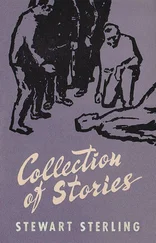I drove on again, past the main entrance. It was chained and locked, and there was no sign of either a gatekeeper or a lodge to accommodate one. It evidently was the property of some one family or group of people, I told myself. I put my foot back on the accelerator and went on my way. Joan wouldn’t have approved my even slowing down to look at the place, I knew; but I hadn’t been able to help myself.
Then sharp eyes betrayed me. Even traveling at the rate I was, I caught sight of a place in the paling where one of the uprights had fallen out of its socket in the lower transverse that held them all; it was leaning over at an angle from the rest, causing a little tent-shaped gap. My good resolutions were all shattered at the sight. I threw in the clutch, got out to look, and before I knew it, had wriggled through and was standing on the inside — where I had no right to be.
“I’ll just look around a minute,” I said to myself, “then get out again before I get in trouble.”
I followed one of the winding paths, and all the old familiar fears came back again as I did so. The sun was rapidly going down and the poplars threw long blue shadows across the ground. I turned aside to look at one of the freshly-erected headstones. There was an utter absence of floral wreaths or offerings, such as are to be found even in the poorest cemeteries, although nearly all the slabs looked fairly recent.
I was about to move on, when something caught my eye close up against the base of the slab. A small curved projection, like a tiny gutter to carry off rainwater. Then just under that, protected by it, so to speak, and almost indiscernible, a round opening, a hole, peering through the carefully-trimmed grass. It was too well-rounded to be an accidental gap or pit in the turf. And it was right where the raised grave met the tombstone. But that curling lip over it! Who had ever heard of a headstone provided with a gutter?
I glanced around to make sure I was unobserved, then squatted down over it, all but treading on the grave itself. I hooked one finger into the orifice and explored it carefully. Something smooth, hard, lined it, like a metal inner-tube. It was not a hole in the ground. It was a pipe leading up through the ground.
I had a penknife with me, and I got it out and scraped away the turf around the opening. A half-inch of gleaming, untarnished pipe, either chromium or brass, protruded when I got through. Stranger still, it had a tiny sieve or filter fitted into it, of fine wire-mesh, like a strainer to keep out the dust.
I was growing strangely excited, more excited every minute. This seemed to be a partial solution to what had haunted me for so long. If it was what I thought it was, it could take a little of the edge off the terror of burial — even for me, who dreaded it so.
I snapped my penknife shut, straightened up, moved on to the next marker. It wasn’t close by, I had to look a little to find it, in the deepening violet of the twilight. But when I had, there was the same concealed orifice at its base, diminutive rain-shed, strainer, and all.
As I roamed about there in the dusk, I counted ten of them. Some bizarre cult or secret society, I wondered uneasily? For the first time I began to regret butting into the place; formless fears, vague premonitions of peril, that had nothing to do with that other inner fear of mine began to creep over me.
The sun had gone down long ago, and macabre mists were beginning to blur the outlines of the trees and foliage around me. I turned and started to beat my way back toward that place in the fence by which I had gained admittance, and which I had left a considerable distance behind me by now.
As I came abreast of the entrance gates — the real ones and not the gap through which I had come in — I saw the orange flash of a lantern on the outside of them, through the twilight murk. Chains clanged loosely, and the double gates ground inward, with a horrid groaning sound. Instinctively I jumped back behind a massive stone urn on a pedestal, with creepers spilling out of the top of it.
The gates clanged shut again, lessening my chances of getting out that way, which was the nearer of the two. I peered cautiously out around the narrowed stem of the urn, to see who it was.
A typical cemetery-watchman, no different from any of the rest of his kind, was crunching slowly along the nearest path, lantern in hand. Its rays splashed upward, tinged his face, and downward around the ground at his feet, but left the middle of his body in darkness. It created a ghastly effect, that of a lurid head without any body floating along above the ground. I quailed a little.
He passed by close enough for me to touch him, and I shifted tremblingly around to the other side of the urn, keeping it between us. He stopped at the nearest grave, only a short distance away, set his lantern close up against the headstone, and turned up the oil-wick a bit higher. I could see everything he was doing clearly in the increased radiance now. Could see, but couldn’t understand at first.
He squatted down on his haunches just as I had — this, fortunately, wasn’t the one I had disturbed with my penknife — and I saw him holding something in his hand that at first sight I mistook for a flower, a single flower or bloom, that he was about to plant. It had a long almost invisible stalk and ended in a little puff or cluster of fuzz, like a pussywillow. But then when I saw him insert it into the little orifice at the base of the slab, move it busily around, that gave me the clue to what it really was. It was simply a wire-handled brush, such as housewives use for cleaning the spouts of kettles. He was removing the day’s accumulated dust and grit from the little mesh-strainer in the pipe, to keep it from clogging. I saw him take the brush out again, put his face down nearly to the ground, and blow his breath into it to help the process along. I heard the sound that made distinctly — “Phoo! ” Even as I watched, he got up again, picked up his lantern, and trudged on to the next grave, and repeated the chore.
A chill slowly went down my spine. Why must those orifices be kept unclogged, free of choking dust, like that? Was there something living, breathing, that needed air, buried below each of those headstones?
I had to grip the pedestal before me with both hands, to hold myself up, to keep from turning and scampering blindly away then and there — and betraying my presence there in the process.
I waited until he had moved on out of sight, and some shrubbery blotted out the core of his lantern, if not its outermost rays; then I turned and darted away, frightened sick.
I beat my way along the inside of the fence, trying to find that unrepaired gap; and maddeningly it seemed to elude me. Then just when I was about ready to lose my head and yell out in panic, I glimpsed my car standing there in the darkness on the other side, and a few steps further on brought me to the place. Arms shaking palsiedly, I held up the loosened paling and slipped through. I stopped a minute there beside the car, wiping off my damp forehead on the back of my sleeve. Then with a deep breath of relief, I reached out, opened the car-door. I slipped in, turned the key... Nothing happened. The ignition wire had been cut in my absence.
Before the full implication of the discovery had time to register on my mind, a man’s head and shoulders rose silently, as out of the ground, just beyond the opposite door, on the outside of the road. He must have been crouched down out of sight, watching me the whole time.
He was well-dressed, no highwayman or robber. His face, or what I could see of it in the dark, had a solemn ascetic cast to it. There was a slight smile to his mouth, but not of friendliness.
His voice, when he spoke, was utterly toneless. It held neither reproach, nor threat, nor anger. “Did you—” His stony eyes flickered just once past the cemetery-barrier — “have business in there?”
Читать дальше












